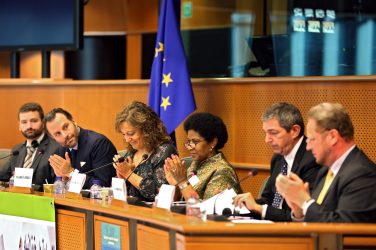Despite decades of female empowerment, the right to abortion continues to be contested in a number of European countries. In some countries, such as Poland, gained freedoms are being reversed by ruling conservative parties. E&M‘s Beatričė Juškaitė & Ieva Gudaitytė look into how activists and organisations help women – in Poland and worldwide – who seek to terminate pregnancies. This is the first part of this story; the second part can be found here. Both articles originally appeared in Lithuanian on the portal of the Lithuanian Centre for Human Rights (Lietuvos žmogaus teisių centras).
“I was freaking out”. This is how Maria, a 25-year-old Polish student based in Berlin, reacted when she heard that in Poland the Constitutional Court had ruled out abortion for reasons related to foetal defects, claiming it is contrary to the Polish constitution. “It’s scary,” Anne, a 34-year-old doctoral student in the history of photography, nodded in agreement.
Both women are activists from the “Ciocia Basia” network, which has been operating for almost five years to help Poles seeking abortion in Berlin. The network takes care of their arrival, accommodation, visits to doctors, communication, and, if necessary, provides financial support. “I feel an urge to do something,” explains Maria, while planning a busy year with her team.
As we continued with our virtual conversation, in November 2020, the biggest crowd since the fall of Poland’s communist regime 30 years ago had already started to flood the streets in protest of the court’s ruling. When it enters into force, abortion will only be possible in Poland in the event of rape, incest, or threats to the mother’s life.
“Who would take a collective called “Auntie” seriously?”
After gaining power in 2015, the Polish ruling party Law and Justice (PiS) implemented changes that undermined the independence of the judiciary power and enabled the untamed spread of cynicism for human rights. More than 100 Polish regions declared themselves “LGBT-free zones”, which Ursula von der Leyen, the President of the European Commission, described as “zones without humanity” in her annual report of September 2020. According to Human Rights Watch, PiS has also attacked women’s rights activism through raids on offices, denial of funding, public smear campaigns, and disciplinary action.
In 2016, the party sought to restrict what was already one of the strictest abortion laws in Europe, adopted in 1993 as an antithesis to the liberal abortion policy of socialist Poland. A wave of protests called “Black Monday” immediately erupted. In response, Sarah Diehl, a concerned actress and writer from neighbouring Germany, set up the “Ciocia Basia” network. Ciocia, Polish for “Auntie”, embodies safety and reliability offered by the collective. The name was also chosen to avoid unwanted attention from the authorities. “Who would take a collective called “Auntie” seriously?” smiles Anne, who started volunteering for the network two years ago.
“If a person contacts us, she has found a safe way to have an abortion”
Both “Ciocia Basia” activists and numerous studies suggest that bans as the one in Poland do not significantly affect the number of abortions. Women who have the means can go to clinics located on the Polish border, many of which offer overpriced procedures. Women who do not have the financial resources may find themselves seeking to terminate pregnancies based on unreliable sources found online, putting their own health at risk. Activists also note that such bans increase the number of late-term abortions.

“If a person contacts us, she has found a safe way to have an abortion,” says Anne. Although the “Ciocia Basia” network, which unites up to 25 volunteers, does not collect data, the Polish Federation for Women and Family Planning estimates that every year between 120.000 to 150.000 people in Poland get an abortion illegally or go abroad. According to official data cited by the government, over one thousand legal abortions are done in Poland every year, most of which are due to foetal malformations.
“Everyone around contributes as best as they can”
Supporting abortion abroad is not the only way in which “Ciocia Basia” offers help. After 2017, the Polish right-wing government made emergency contraceptives, the so-called “morning-after pill”, available only with a doctor’s prescription. The morning-after pill prevents an unplanned pregnancy by delaying the ovulation and it must be taken within 3 or 5 days after the unprotected sex. However, the sooner it is used, the more effective. According to Amnesty International, the requirement of a doctor’s prescription has hit those in remote rural areas the hardest.
“Everyone around is doing the best they can,” Anne shrugs and adds that “Ciocia Basia” activists send these contraceptives to Poland with the help of friends who are pharmacists. “Ciocia Basia” also closely cooperates with other well-known feminist groups, such as the Polish “Aborcyjny Dream Team”, “Kobiety w Sieci” (Polish for “Women on Web”), and the international organization “Abortion Without Borders”.
Abortion amidst the pandemic
The Covid-19 and related movement restrictions made “Ciocia Basia” and other abortion groups look for new ways to operate. Activists say there is a growing interest in medical abortion at home, also known as non-surgical abortion, which provides a non-invasive method to end a pregnancy with a combination of misoprostol and mifepristone.
“Medical abortion until the ninth week is much safer and easier,” explains Maria, who has been volunteering at “Ciocia Basia” together with her older sister for two years. “We are trying to inform people that this method is not really illegal in Poland,” adds Anne. Unlike other countries where abortion is banned, women in Poland are not subject to a penalty for an illegal abortion. Instead, the medical personnel ordering and carrying out the termination of pregnancy are subject to criminal penalties, including imprisonment.
Thank you (not), PiS!
Paradoxically, the PiS policies contributed to growing visibility of the women’s rights groups, including the “Ciocia Basia” network. “We started out with stickers, flyers… Now we are contacted by people from very different groups within Polish society,” says Anne. According to activists, “Ciocia Basia” also receives requests from trans people and foreigners, including international students, living in Poland.
Moreover, the rhetoric of the ruling party, which divided society into hostile camps, encouraged people to speak out. In November, the front page of “Gazeta Wyborcza”, a daily newspaper published in Warsaw, published portraits of seven women with a laconic, yet powerful note: “We had an abortion.” It reminds of the French “343 Manifesto” published in 1971, which equalled an act of civil disobedience, as its 343 signatories confessed having had an abortion and demanded the procedure to be legalized.
“The only thing I want is to understand and help”
Activists note that often the people contacting “Ciocia Basia” start by stressing that no one should find out about the abortion. Simultaneously, many of those who seek abortion through the network crave to share their stories. “This is the hardest part,” Maria says, “that I, a stranger from Berlin, am the only person to talk to safely.” “Listening and answering questions is an essential part of the work. I don’t care why one made this decision. The only thing I want is to understand and help,” says Anne.
When asked which moments with “Ciocia Basia” have been the most powerful, Maria recalls one woman whom she accompanied for the abortion. “I have taken my life back!” she exclaimed happily after the procedure, leaving Maria surprised. The activist argues that since abortion stories are rarely heard in public, it is difficult to fully grasp the diversity of women’s experiences. Additionally, the lack of visibility makes it easier to manipulate public opinion and encourages abortion-related myths.
“I have taken my life back!” she exclaimed happily after the procedure, leaving Maria surprised.
One of them is that maternity and pro-choice stances are incompatible. On the contrary, Anne and Maria argue, a large proportion of women who turn to “Ciocia Basia” as they seek abortion abroad, as well as volunteers working for the network are mothers themselves. “When you have children, you do not only find out how much you can bear, but also what the right to your own body and opinion really means,” contemplates Anne.
“The personal is political”
“How can the EU’s 28 member states agree on edible snails and shower heads, yet remain silent on the reproductive rights of half the population of the continent?” is a rhetorical question asked by Prune Antoine, a Berlin-based French writer, co-founder, and editor-in-chief of the Sisters of Europe website, in her opinion piece published in The Guardian in July 2019. Referring to the second-wave feminism slogan that “the personal is political”, activists from “Ciocia Basia” are similarly critical of those who rule Europe.
While the European Union seeks a unified response to autocratic Poland, PiS leader Jaroslaw Kaczynski populistically asserts that he will not succumb to “threats from Brussels”. In December 2020, EU leaders clinched a deal to end a blockade by Poland and Hungary of the bloc’s €1.8 trillion budget-and-recovery package over plans to link EU payments to respect for the rule of law. While Warsaw and Budapest referred to these efforts of making funds conditional on a country’s respect for core European values, as “political blackmail”, various human-rights groups called the compromise reached by EU leaders as a concession to the bloc’s authoritarian rulers.
“Solidarity and fighting pay off”
“For me, what really illustrates the idea of European unity is the time, energy, and resources that people allocate to help each other,” says Anne, “Solidarity and fighting pay off.”
According to Anne and Maria, “Ciocia Basia” has been accompanying around 8 people every week in Berlin since the pandemic hit. Many Poles have also contacted the network to make sure it operates in case they need its assistance someday.
These rates will unlikely slow down any time soon. But, hopefully, the silence around abortion stories will be increasingly broken.
Cover photo: Brendan Donnet – @brendandonnet | http://brendandonnet.com.






